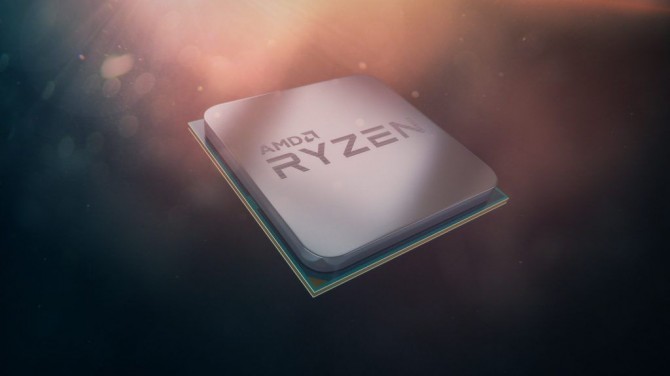What Is AMD Ryzen (and When Is It Coming to Laptops)?
Sign up to receive The Snapshot, a free special dispatch from Laptop Mag, in your inbox.
You are now subscribed
Your newsletter sign-up was successful
AMD is back in the CPU game. Its newest processor line, called Ryzen (pronounced Rye-zen), is meant to face off with Intel's Core i CPUs on both gaming and productivity. Right now, you can only buy the Ryzen 7 series desktop processors, but you'll soon see a wider variety of SKUs -- including laptop chips that could change the mobile market. We've answered some key questions about the new platform below.
What is AMD Ryzen?
Ryzen is AMD's latest generation of CPUs. If you've ever seen an "Intel Core i" sticker on your laptop is referring to your processor, and Ryzen is an alternative. This isn't AMD's first foray into CPUs, but its one of its most serious, and perhaps most critical.
AMD suggests that Ryzen is meant specifically for the enthusiast market -- think gamers and high-end productivity users.
Is Ryzen in laptops?
Not yet. The first batch of CPUs are exclusively for desktop computers.
Will Ryzen Come to Laptops?
Yes. AMD told Laptop Mag that "we expect to see Ryzen in the mobile space in the second half of 2017."
These will likely be in the form of an APU, or accelerated processing unit. That's a marketing term that AMD uses to refer to a CPU and integrated graphics in one chip.
MORE: Which Laptop CPU is Right for You?
Sign up to receive The Snapshot, a free special dispatch from Laptop Mag, in your inbox.
What's the AMD Ryzen naming structure?
It's just as confusing as Intel's. The first three Ryzens are:
- Ryzen 7 1700
- Ryzen 7 1700X
- Ryzen 7 1800X
So the structure is Ryzen Y ZZZZ, where Y is the family (3, 5, or 7) and Z is the more specific model number.
Just as with Intel's Core i series, 3 is the entry level, while 5 is mid-level and 7 is for enthusiasts and professionals.
How will Ryzen compare to Intel's Core i CPUs?
According to AMD's own tests, they hold up quite favorably.
Here are some numbers from a test between the Ryzen 7 1800X and Intel Core i7-6900K, as conducted by our sister site, Anandtech. Note that these are from desktop builds, as the laptop chip is not yet available.
Here's the test build that they used for the Ryzen 7 1800X:
- AMD Ryzen 7 1800X at stock (3.6G base, 4.0G turbo, 4.1G XFR)
- ASUS Crosshair VI Hero Motherboard, BIOS 5704
- Corsair Vengeance Pro DDR4-3000 2x8 GB, running at DDR4-2400
- Rosewill 500W SilentNight 80PLUS Power Supply
- Crucial MX200 1TB SSD
- AMD R7 240 1GB as a GPU
- Windows 10 Pro
| Test | Ryzen 7 1800X | Intel Core i7-6900K |
| Cinebench 15 SingleThreaded | 161 points | 155 points |
| Cinebench 15 MultiThreaded | 1,628 points | 1,477 points |
| Blender Render | 296.5 seconds | 294.3 seconds |
| PCMark 8 Home (non-OpenCL) | 3,806 points | 3.920 points |
| PCMark 8 Work (non-OpenCL) | 3,620 points | 3,171 points |
| Google Octane 2.0 on Chrome 36 | 33,505 points | 34,785 points |
Laptop Upgrade Guide
- How to Tell If You Can Upgrade Your Laptop
- How to Install an mSATA SSD Boot Drive
- How to Upgrade Your Laptop’s Hard Drive to an SSD
- How to Install an M.2 SSD in the Lenovo ThinkPad T440s
- How to Upgrade the RAM on the Lenovo ThinkPad T440s
- How to Upgrade the RAM (Memory) on a Laptop
- How to Upgrade the SSD in Your MacBook Pro
- How to Upgrade Your Alienware 17’s SSD and Hard Drive
- How to Upgrade Your Alienware 17's RAM
- How to Upgrade Your Dell XPS 13's SSD
- How to Upgrade Your ThinkPad 13's RAM
- How to Upgrade Your ThinkPad 13's SSD
- How to Upgrade Your ThinkPad T460s' RAM
- How to Upgrade Your ThinkPad T460s' SSD
Andrew is a contributing writer at Laptop Mag. His main focus lies in helpful how-to guides and laptop reviews, including Asus, Microsoft Surface, Samsung Chromebook, and Dell. He has also dabbled in peripherals, including webcams and docking stations. His work has also appeared in Tom's Hardware, Tom's Guide, PCMag, Kotaku, and Complex. He fondly remembers his first computer: a Gateway that still lives in a spare room in his parents' home, albeit without an internet connection. When he’s not writing about tech, you can find him playing video games, checking social media and waiting for the next Marvel movie.

